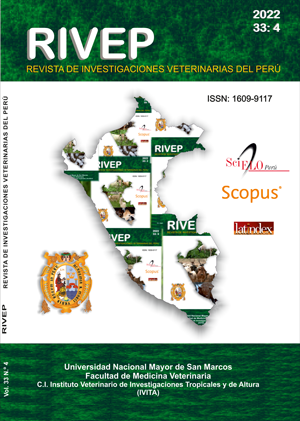Effect of a phytobiotic additive on the productive performance and quality of broiler meat in a tropical breeding environment
DOI:
https://doi.org/10.15381/rivep.v33i4.21509Keywords:
heat stress, essential oil, poultry, antioxidantsAbstract
The aim of this study was to evaluate the effect of the inclusion of a phytobiotic composed of essential oil of Rosmarinus officinalis, herbal choline, Cynara scolymus meal and Silybum marianum on the productive parameters and the drip losses of the carcass of broilers raised in the humid tropics. In total, 4800 male Ross AP chickens were used, housed in 10 open poultry shed and at ambient temperature (27-37 °C). The birds were distributed in a completely random model composed of five repetitions and two treatments: (D1) control diet with commercial base feed, (D2) commercial base feed with the inclusion of the phytobiotic at 400 g/t. The experimental period lasted 42 days and weight gain, feed intake, feed conversion rate and productivity index were determined. For the evaluation of meat quality, drip losses and malondialdehyde production were measured. On day 42, the animals that consumed the phytobiotic presented a better feed conversion rate and higher productivity index (1.50 and 96.78 respectively), compared to the control group (1.60 and 81.33 respectively). Regarding meat quality, the animals supplemented with the phytobiotic had lower drip losses. In conclusion, animals raised in the humid tropics supplemented with phytobiotics showed better efficiency in the production process.
Downloads
Downloads
Published
Issue
Section
License
Copyright (c) 2022 Anny Lucia Celis Estupiñan, Yander Orduz Duran, Angie Liceth Niño López, Angi Lorena Montoya García, Loufrantz Parra, Katerin Luna Rodriguez, Jaime Ángel-Isaza

This work is licensed under a Creative Commons Attribution 4.0 International License.
AUTHORS RETAIN THEIR RIGHTS:
a. Authors retain their trade mark rights and patent, and also on any process or procedure described in the article.
b. Authors retain their right to share, copy, distribute, perform and publicly communicate their article (eg, to place their article in an institutional repository or publish it in a book), with an acknowledgment of its initial publication in the Revista de Investigaciones Veterinarias del Perú (RIVEP).
c. Authors retain theirs right to make a subsequent publication of their work, to use the article or any part thereof (eg a compilation of his papers, lecture notes, thesis, or a book), always indicating the source of publication (the originator of the work, journal, volume, number and date).










